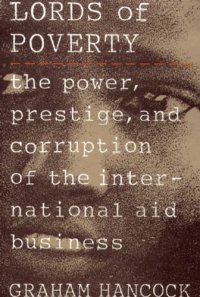
Ebook: The Lords of Poverty: The Power, Prestige, and Corruption of the International Aid Business
Author: Graham Hancock
- Tags: Development & Growth, Economics, Business & Money, Political Science, Comparative Politics, Constitutions, History & Theory, Reference, Politics & Government, Politics & Social Sciences
- Year: 1992
- Publisher: Atlantic Monthly Press
- Edition: 1st
- Language: English
- pdf
Each year some sixty billion dollars are spent on foreign aid throughout the world. Whether in donations to charities such as Save the Children, Oxfam, CARE, UNICEF, or the Red Cross, in the form of enormous loans from the World Bank, or as direct payments from one government to another, the money is earmarked for the needy, for relief in natural disastersfloods or famines, earthquakes, or droughtsand for assistance in the development of nations.
The magnitude of generosity from the world’s wealthy nations suggests the possibility of easing, if not eliminating, hunger, misery, and poverty; in truth, however, only a small portion of this sixty billion dollars is ever translated into direct assistance. Thanks to bureaucratic inefficiency, misguided policies, large executive salaries, political corruption, and the self-perpetuating overhead” of the administrative agencies, much of this tremendous wealth is frittered away, as Graham Hancock’s alarming and comprehensive book reveals. Hancock cuts through the smoke screens and hot air of the aristocracy of mercy” to provide a critical look at a multinational business that has never been subject to strict accountability.
Lords of Poverty is a case study in betrayals of a public trust. The shortcomings of aid are numerous, and serious enough to raise questions about the viability of the practice at its most fundamental levels. Hancock’s report is thorough, deeply shocking, and certain to cause critical reevaluationof the government’s motives in giving foreign aid, and of the true needs of our intended beneficiaries.
The magnitude of generosity from the world’s wealthy nations suggests the possibility of easing, if not eliminating, hunger, misery, and poverty; in truth, however, only a small portion of this sixty billion dollars is ever translated into direct assistance. Thanks to bureaucratic inefficiency, misguided policies, large executive salaries, political corruption, and the self-perpetuating overhead” of the administrative agencies, much of this tremendous wealth is frittered away, as Graham Hancock’s alarming and comprehensive book reveals. Hancock cuts through the smoke screens and hot air of the aristocracy of mercy” to provide a critical look at a multinational business that has never been subject to strict accountability.
Lords of Poverty is a case study in betrayals of a public trust. The shortcomings of aid are numerous, and serious enough to raise questions about the viability of the practice at its most fundamental levels. Hancock’s report is thorough, deeply shocking, and certain to cause critical reevaluationof the government’s motives in giving foreign aid, and of the true needs of our intended beneficiaries.
Download the book The Lords of Poverty: The Power, Prestige, and Corruption of the International Aid Business for free or read online
Continue reading on any device:

Last viewed books
Related books
{related-news}
Comments (0)